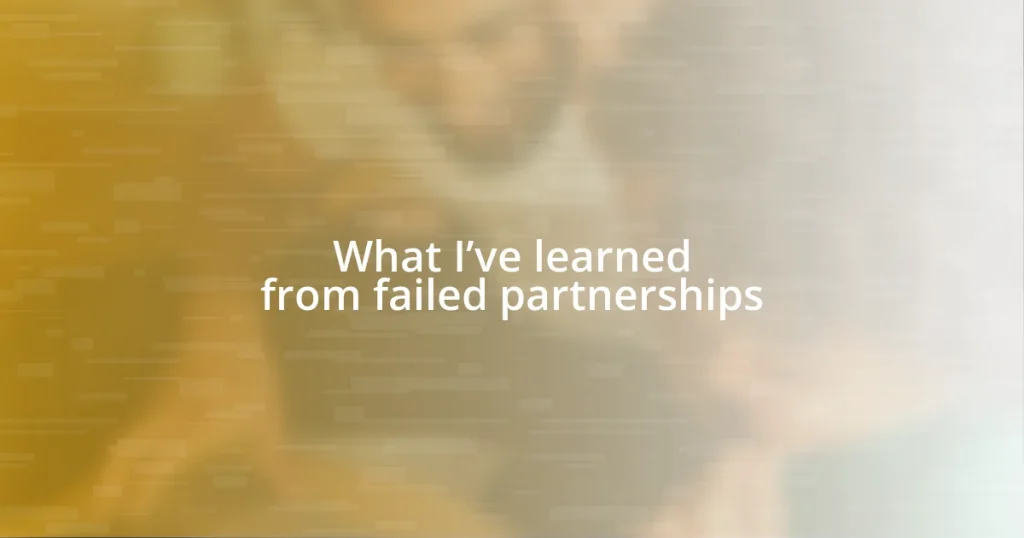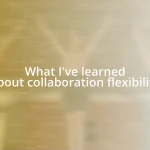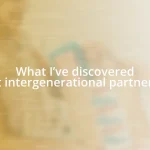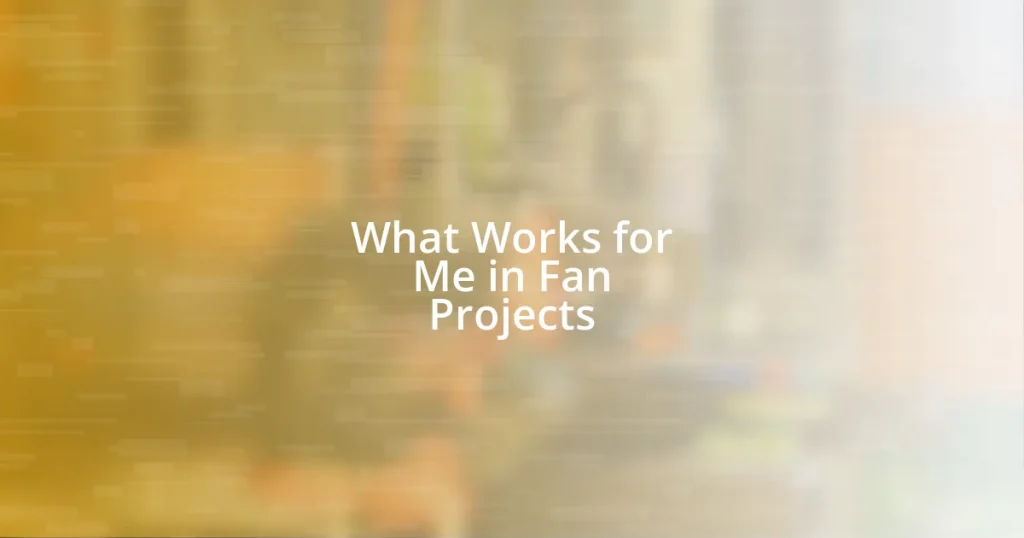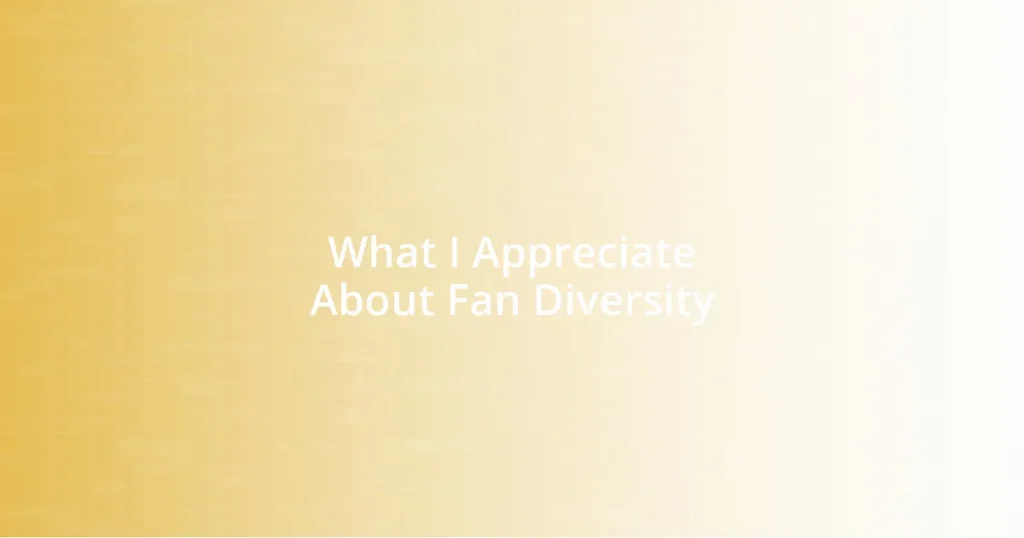Key takeaways:
- Partnership failures often arise from misaligned goals, communication breakdowns, and imbalanced contributions. Open dialogue and clear expectations are essential for healthy collaboration.
- Self-reflection is crucial for personal growth; acknowledging one’s role in misunderstandings and missed deadlines can lead to better future partnerships.
- Building resilience involves embracing failures as learning opportunities, maintaining regular check-ins, and fostering vulnerability to strengthen connections with partners.
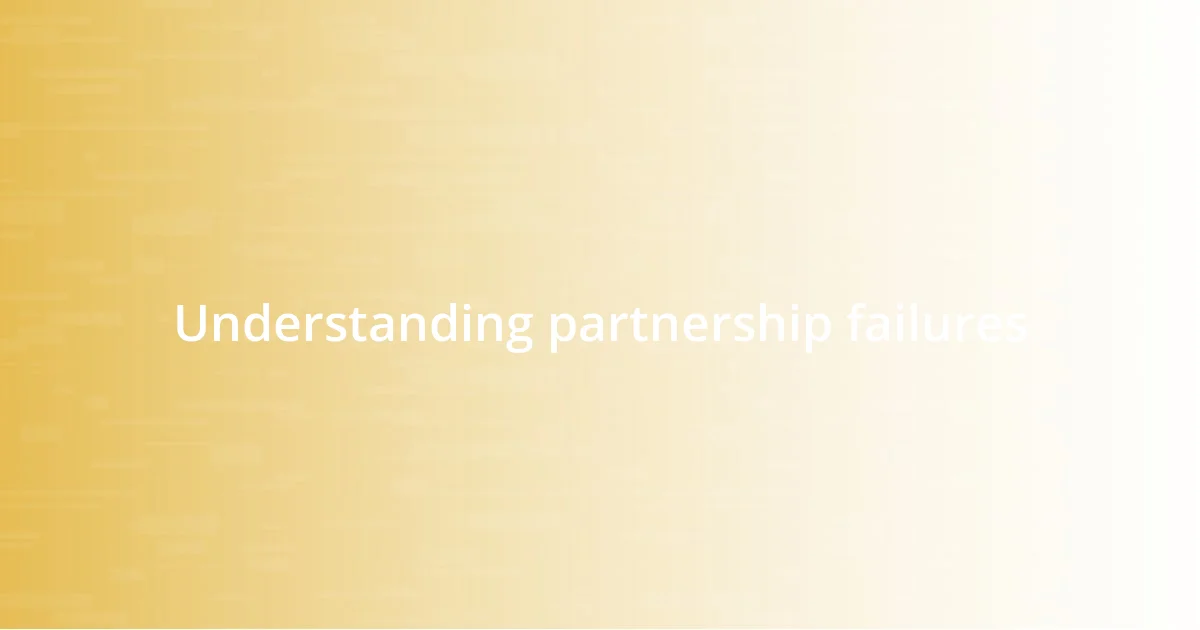
Understanding partnership failures
Partnership failures often stem from misaligned goals or expectations. I once teamed up with a friend to launch a project, believing our shared enthusiasm would be enough. However, as we delved into it, we discovered our visions were worlds apart. Have you ever felt that disconnect in a collaborative effort? It can lead to frustration and resentment, making it hard to move forward together.
Emotions play a significant role in partnership dynamics. I remember feeling blindsided when a colleague didn’t communicate concerns effectively. It taught me that open and honest dialogue is crucial. I often wonder: how many unresolved feelings linger beneath the surface of seemingly functional collaborations? This lack of transparency can easily lead to misunderstandings.
Then there’s the issue of accountability. In one of my past ventures, I relied heavily on a partner to deliver on deadlines. When that didn’t happen, it caused stress for everyone involved. I’ve learned that establishing clear roles and responsibilities is vital. How do you ensure everyone is on the same page? It’s all about creating a framework that supports shared commitment, enabling the partnership to thrive rather than falter.
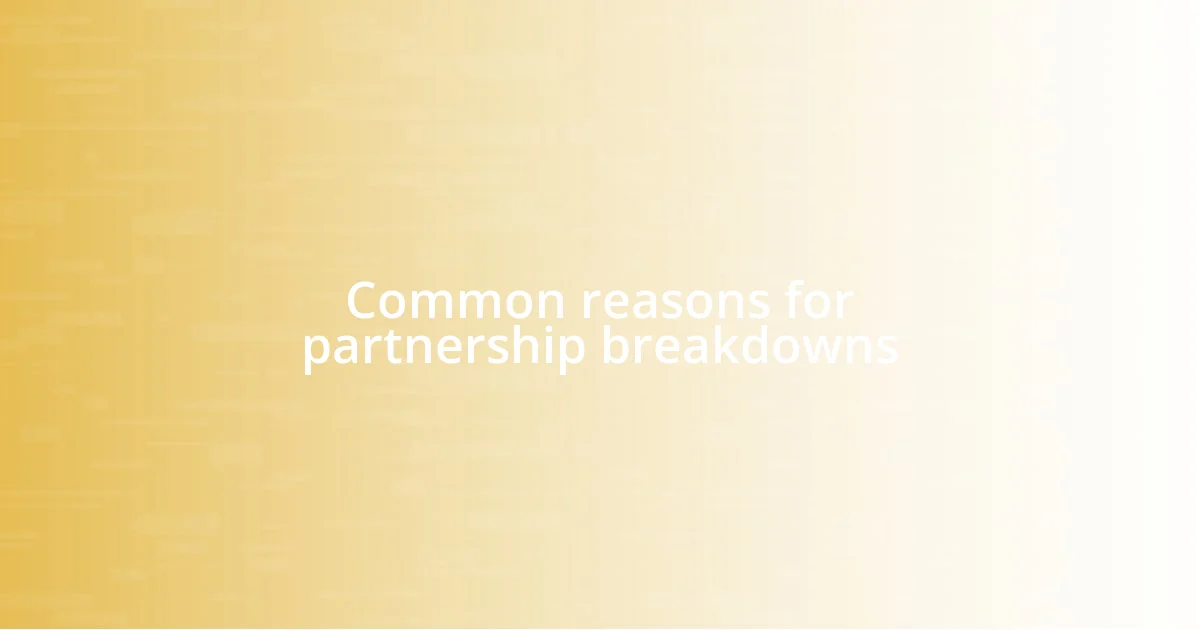
Common reasons for partnership breakdowns
Common reasons for partnership breakdowns often revolve around communication breakdowns and differing expectations. In one collaboration, I was eager to dive into an idea, but my partner seemed to hold back. As time went on, I realized that their hesitance stemmed from feeling overwhelmed—not a lack of interest. I could have opened up a dialogue sooner. Reflecting back, I wish we had established regular check-ins to share our feelings about the project’s progress.
Another significant factor is the imbalance of contributions. I once had a partnership where I invested countless hours, while my partner failed to match that level of effort. This disparity bred resentment, leading to a passive-aggressive atmosphere. I can’t help but think: have you ever felt like you were carrying the weight alone? It’s essential to openly discuss workloads to avoid such situations and ensure that both parties feel valued and committed.
Finally, external pressures can also strain partnerships. During one project, other life commitments caused delays in my partner’s involvement. I felt abandoned at a crucial moment, which made me re-evaluate the partnership’s viability. It’s vital to consider how personal circumstances can impact collaboration. Have you ever experienced a partnership falter due to outside distractions? Recognizing these factors in advance can help in developing flexible frameworks that support each other’s needs during tough times.
| Common Reasons | Impact on Partnership |
|---|---|
| Miscommunication | Leads to misunderstandings and frustration |
| Imbalanced Contributions | Creates resentment and burnout |
| External Pressures | Causes shifts in priorities and commitment |
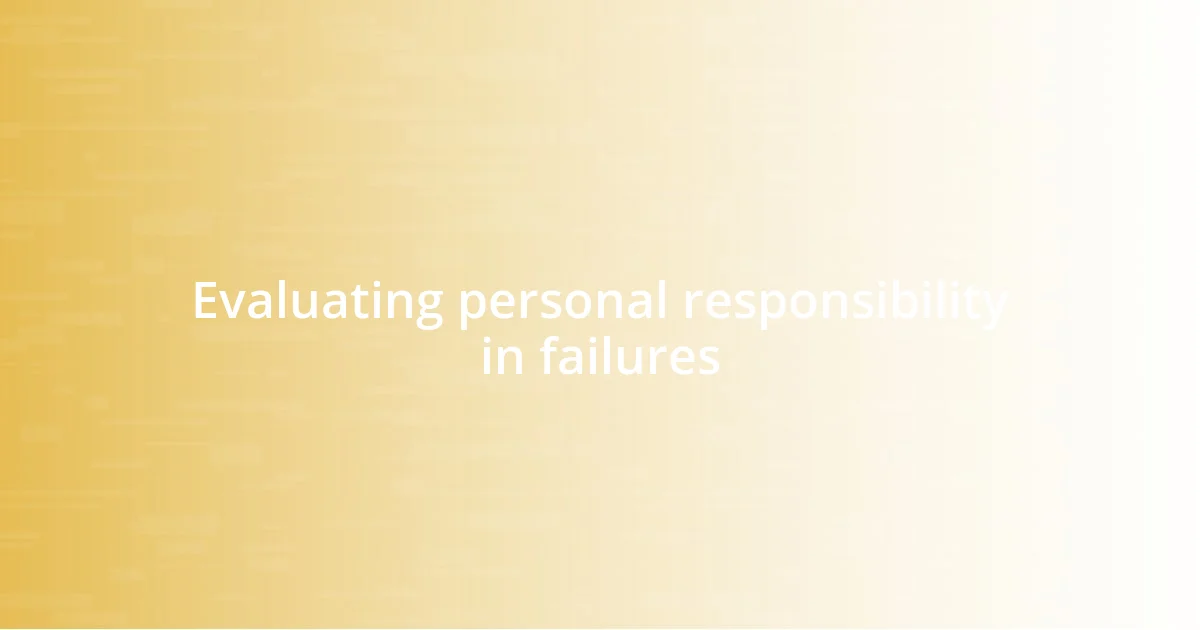
Evaluating personal responsibility in failures
Evaluating personal responsibility in failures can be challenging, yet it’s a crucial part of learning from past experiences. I recall a partnership where I was quick to place blame on my co-founder when things started to go south. Looking back, I realize that I didn’t hold up my end as diligently as I should have. It’s easy to point fingers, but self-reflection is key for growth. Taking ownership of my actions fosters valuable insights that can pave the way for future success.
- Acknowledge my role in misunderstandings or missed deadlines.
- Reflect on how my actions—or inactions—contributed to the outcome.
- Consider what I could have communicated better to steer the partnership in a positive direction.
- Recognize patterns in my behavior that may need to change in future collaborations.
When I think about those moments of discomfort, they often marked turning points for me. I remember feeling the weight of a failed partnership and realizing that true accountability meant assessing my contributions honestly, rather than getting lost in regret. It was this introspection that helped me grow, ultimately leading toward healthier, more fruitful collaborations.
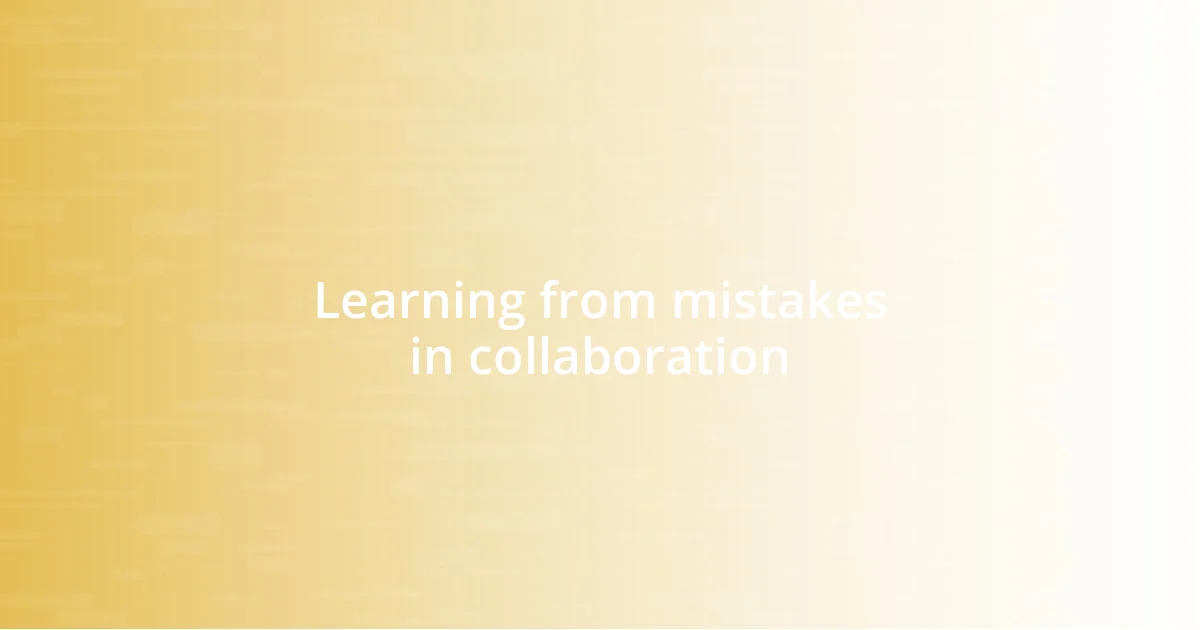
Learning from mistakes in collaboration
Learning from mistakes in collaboration is often more about understanding our own missteps than blaming others. I once worked with a partner who was brimming with innovative ideas, but I found myself struggling to adapt my vision to fit theirs. It was a humbling experience, realizing that I had allowed my own rigidity to stifle creativity. How often do we hold onto our perspectives too tightly, thinking we’re right? I’ve learned that flexibility can open doors to collaboration that I never imagined.
Even when things unravel, I’ve found that reflecting on what went wrong offers richer lessons than any success might provide. In one partnership, I noticed I hesitated to share my concerns; instead, I bottled up frustrations until they erupted. That outburst was not just a moment of anger but a reflection of my failure to communicate the buildup of small annoyances. It made me contemplate: what if I had addressed these issues sooner? The art of expressing vulnerability can foster deeper collaborations, making every dialogue a chance for mutual growth rather than conflict.
Additionally, I’ve realized that accountability in a group setting involves more than just carrying my own weight—it means recognizing the dynamics at play. I once oversaw a project where most of the responsibilities fell on me. Initially, I was resentful, believing my partner was simply slacking off. But upon examining my feelings, I saw that I hadn’t clearly defined roles. Have you ever found yourself in a similar situation? I discovered that having open conversations about responsibilities can prevent the silent resentments that poison partnerships. It’s a lesson I now prioritize in every collaboration.
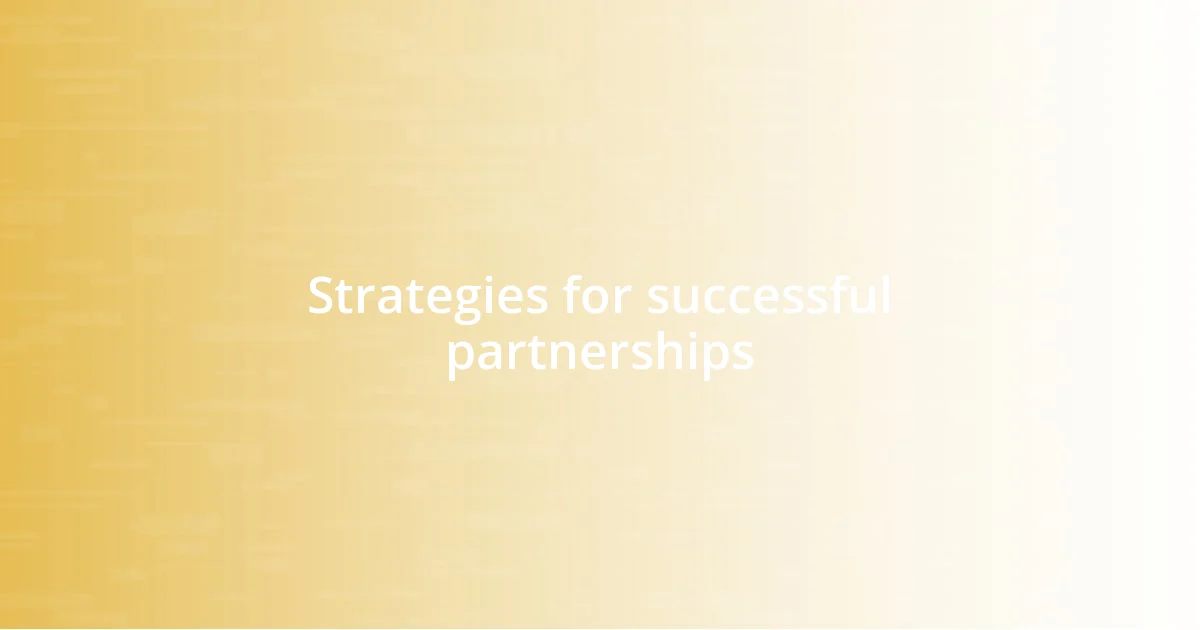
Strategies for successful partnerships
When it comes to forging successful partnerships, clearly defining expectations from the outset is crucial. I learned this the hard way during a collaboration where we dove in headfirst without setting guidelines. It felt exhilarating initially, but soon, confusion reigned, leaving us both feeling frustrated. How many times have you jumped into a partnership without a clear roadmap? That experience taught me to always establish roles, deadlines, and mutual goals early on, ensuring everyone is on the same page and accountable.
Open and honest communication also plays a vital role in nurturing a healthy partnership. In one project, I was hesitant to voice my concerns about a decision I disagreed with, fearing it might create tension. Instead, I bottled it up until it led to misunderstandings that eventually drifted us apart. Reflecting on that situation, I realized that addressing issues early can prevent much bigger rifts. Have you ever kept quiet when you knew you should have spoken up? From that moment, I committed to fostering an environment where every partner feels safe sharing thoughts—after all, differing opinions can lead to innovative solutions.
Trust is the foundation of any strong partnership. I remember a collaboration that started off on solid ground, but combined with my partner’s unpredictable decisions, it quickly crumbled. I learned to cultivate trust not just by fulfilling my promises, but by showing my reliability during challenging times. How do you build that trust with your partners? For me, it means being transparent about intentions, addressing mistakes directly, and supporting each other through ups and downs. These practices have not only strengthened my partnerships but have also deepened the respect we share, paving the way for lasting success.
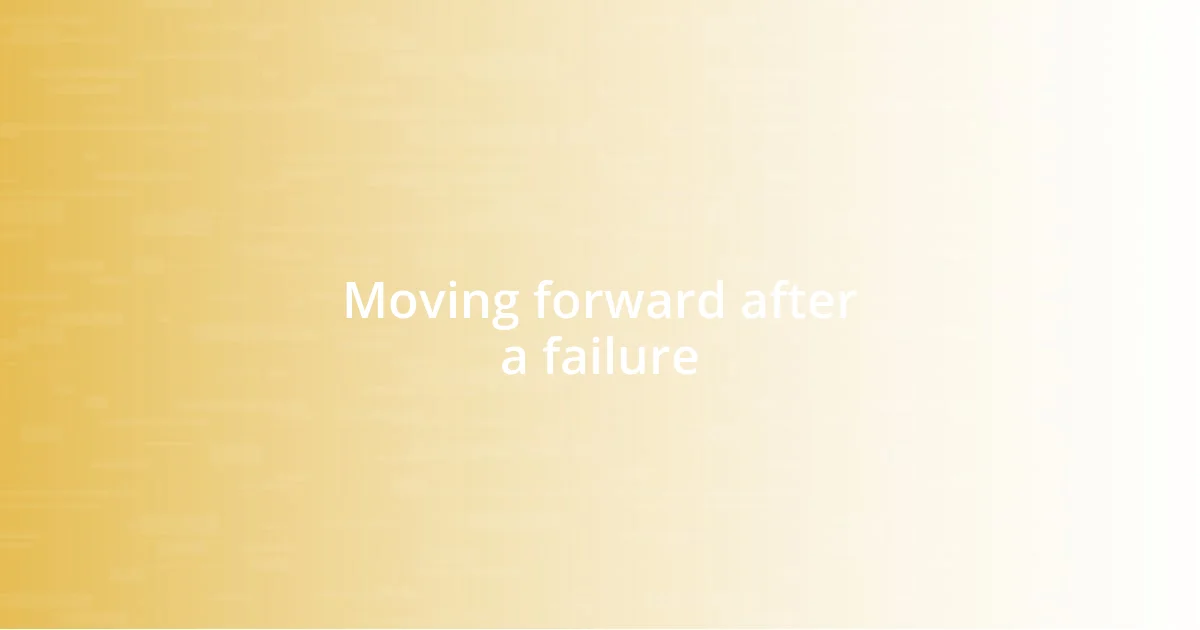
Moving forward after a failure
Moving on from a failed partnership can feel daunting, but it’s a necessary part of personal and professional growth. After my last collaboration fell apart, I sat down to analyze what went wrong. It was eye-opening to see how my reluctance to adapt and learn from my partner’s strengths played a significant role in the downfall. Isn’t it interesting how our perceptions can cloud our judgment? I realized that embracing a mindset of learning rather than simply lamenting the loss can turn each setback into a stepping stone forward.
Taking time to reflect is essential, but I’ve found that action is what truly propels us forward. In one situation, instead of dwelling on unmet expectations or frustrations, I decided to make a list of the specific lessons learned. This proactive step helped me transform those painful experiences into actionable insights. Have you ever experienced that rush of clarity when you pinpoint what to improve? For me, this practice not only helped heal the wounds of that failed partnership but also equipped me with strategies for future collaborations.
Building resilience is another key takeaway I’ve embraced after failure. I remember feeling a mix of disappointment and fear about letting others down after a project didn’t pan out. Yet, those feelings ignited a desire to improve and try again. How do we cultivate that resilience? I’ve learned that surrounding myself with supportive peers who uplift rather than judge can make all the difference. They remind me that every experience, even the tough ones, adds to our toolkit for success.
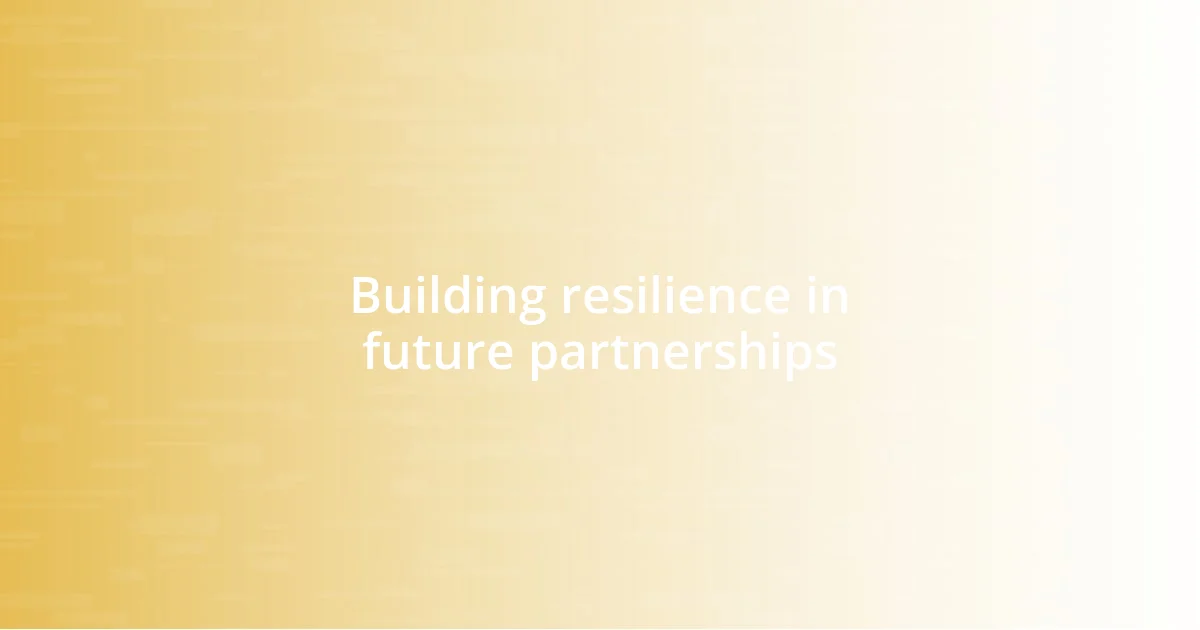
Building resilience in future partnerships
Building resilience in future partnerships requires a mindset shift. I remember a time when I was hesitant to venture into a new collaboration after my last one fell apart. It hit me hard—after all, how can you be excited when you’re staring at past disappointments? But I learned that embracing failure as a teacher rather than a foe can soften that initial sting. Each setback, I discovered, equipped me with invaluable lessons that ultimately shaped my approach to future partnerships.
One strategy that enhances resilience is setting regular check-ins with partners. In a recent project, I suggested weekly meetings to touch base on our progress and any concerns. This wasn’t just about accountability—it became a space for transparency and support. Have you ever found comfort in simply sharing frustrations with someone who understands? Those moments of connection bolstered our partnership, making it easier to tackle challenges head-on together.
Furthermore, welcoming vulnerability is a powerful act in building strong partnerships. I once shared my worries about meeting our joint goals during a particularly tense moment. The weight of that honesty not only relieved some pressure but also encouraged my partner to open up about their fears. This reciprocal sharing helped deepen our connection, reinforcing that we are in it together. Isn’t it fascinating how embracing our humanity can transform a partnership? It’s about being resilient together, and those experiences create a solid foundation for any collaboration to thrive.










